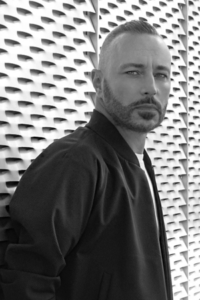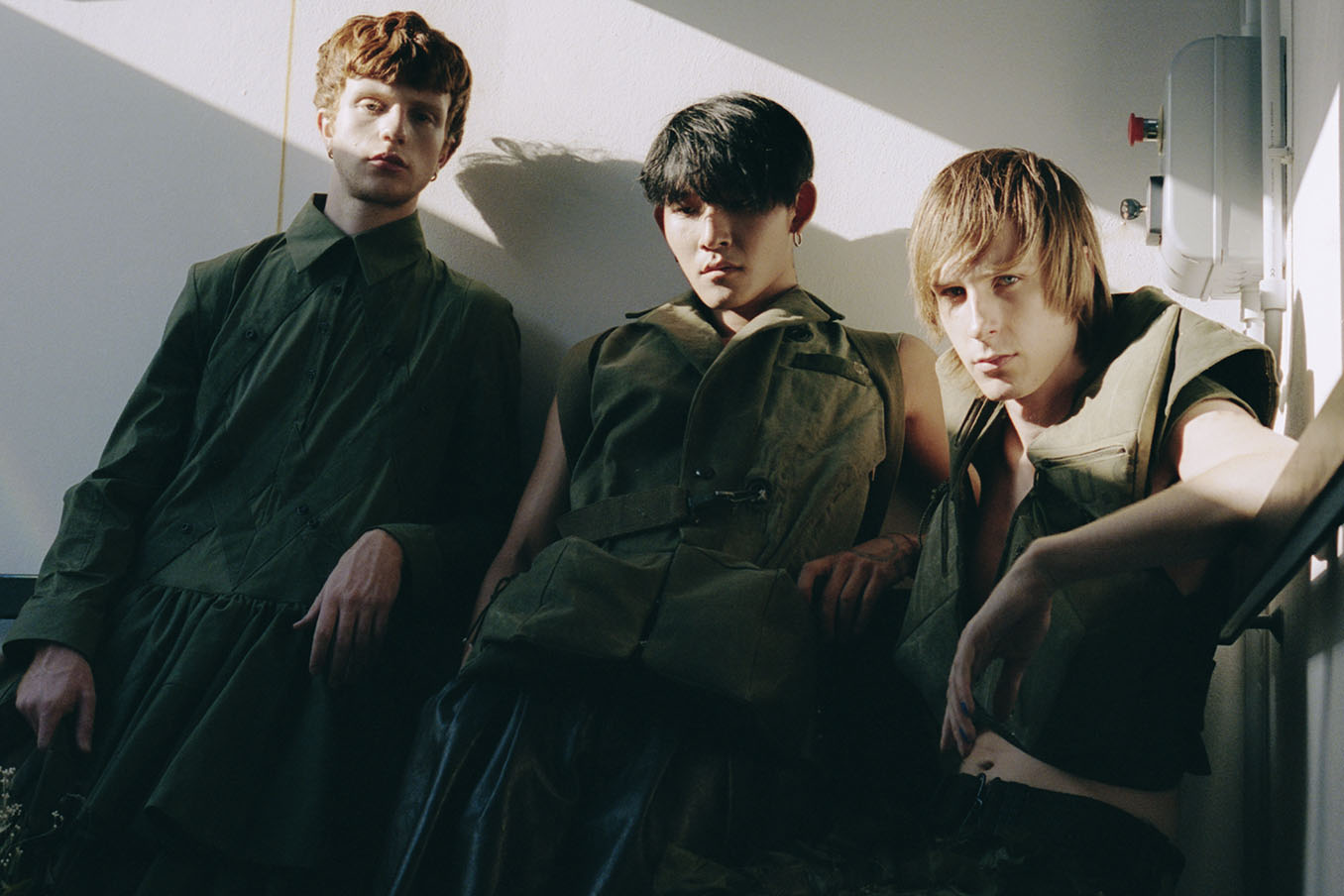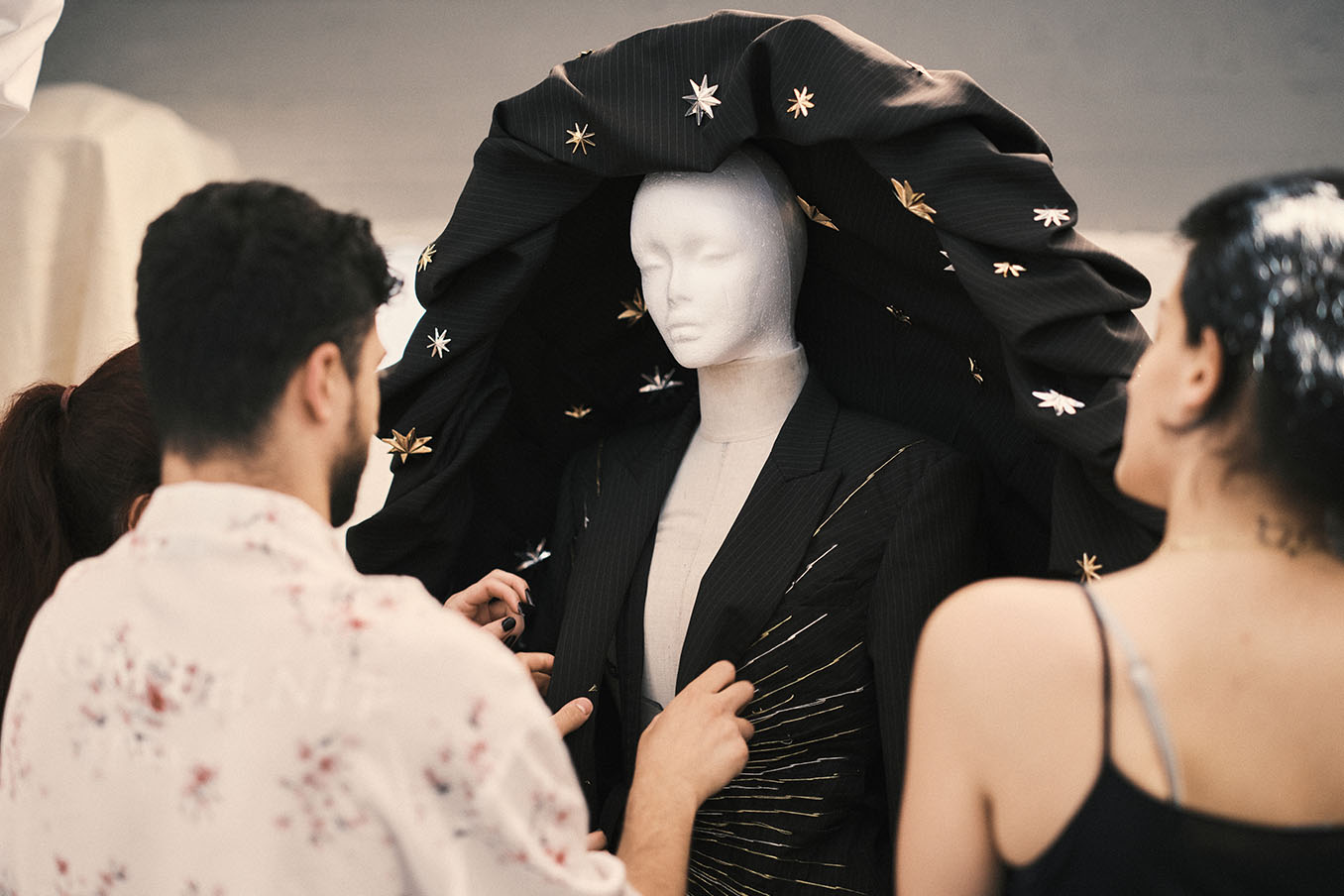Overview
The Master in Costume Design diverges from traditional design programs by positioning costume design as a sophisticated narrative art form. This course employs a research-driven methodology to provide students with a holistic understanding of costume design’s interconnected elements. Students develop skills in historical research, character analysis, technical design, and storytelling through visual interpretation. They cultivate the rare ability to transform narrative insights into compelling visual representations that authentically capture character and era.
Through an integrated approach of scholarly research and creative practice, we nurture visionary costume designers who can seamlessly navigate artistic and technical domains. The course focuses on imparting comprehensive costume design knowledge, including historical context, research methodologies, technical skills, and narrative interpretation.
Our goal is to create graduates with an independent vision, capable of crafting costumes that are not just garments, but powerful storytelling tools that communicate complex character and cultural narratives.
Open Day: Special session
Prospective students interested in this course are invited to attend a special, dedicated session during the Open Day on Friday, November 14th, 2025. This exclusive event will offer the opportunity to meet the course’s faculty members, gain deeper insight into the curriculum, ask questions about career paths in costume design, and experience firsthand what it means to study at Polimoda. It is a unique opportunity to understand how this newly launched program has been structured to address the evolving needs and future directions of the costume design industry.
Highlights
This course covers the spectrum from theoretical knowledge (costume history, cultural analysis) to practical application (character design, garment construction) and real-world industry experience. The comprehensive skill set prepares you for diverse roles in theater, film, and creative industries while developing critical soft skills like storytelling, research methodology, and collaborative creativity.
- In-depth History of Costume
- Focus on Research and Documentation Techniques
- Cultural and Sociological Analysis of Dress
- Character and Narrative Interpretation
- Historical Period Studies
- Costume Design
- Pattern Making
- Draping
- Drawing and Digital Illustration
- Prototyping
- Costume Aging Techniques
- Makeup and Hair Design
- Lighting for Costume Presentation
- Project-Based Learning with two major projects
- Direct Mentorship by Massimo Cantini Parrini
- Diverse Field Trips
- Guest Lectures from Film and Costume Industry Professionals
- Research Methodologies
- Character Analysis
- Technical Design Proficiency
- Narrative Storytelling Through Costume
- Professional Portfolio Creation
- Build relationships with students from different courses
- Develop cross-discipline knowledge
- Build a network of young talents
Mentorship
Mentors at Polimoda are important professional figures from the fashion industry who come into the school to share tools, guidance, motivation and resources with students throughout their program. They provide valuable and practical insights into how students can take what they learn in their course and apply it to the real world. They are essential to fostering student empowerment via their challenging and stimulating lessons crafted uniquely for Polimoda students.
The Master in Costume Design course welcomes Massimo Cantini Parrini as its mentor. His mentorship is marked by his extensive industry experience, as well as distinctive ability for character development through his costumes, with a specific talent for reinterpreting and modernizing historical garments.
Massimo Cantini Parrini
Costume Designer
 A Florence native, Massimo Cantini Parrini’s passion for costume design began in childhood, inspired by his grandmother, a seamstress. He trained under Oscar-winning costume designer Piero Tosi at the Centro Sperimentale di Cinematografia, whose esteem for him led him to join Sartoria Tirelli as an assistant costume designer. He then made his cinema debut with Gabriella Pescucci. He is the owner of an extensive personal collection of over 4,500 original period garments and 10,000 vintage accessories from 1630 to the early 2000s. His most recent work in Pablo Larraín’s Maria Callas biopic, “Maria” (2024), starring Angelina Jolie, was highly praised as a “visual fashion feast” and for its capacity to mirror the different phases of the singer’s life in a sensitive and highly detailed way.
A Florence native, Massimo Cantini Parrini’s passion for costume design began in childhood, inspired by his grandmother, a seamstress. He trained under Oscar-winning costume designer Piero Tosi at the Centro Sperimentale di Cinematografia, whose esteem for him led him to join Sartoria Tirelli as an assistant costume designer. He then made his cinema debut with Gabriella Pescucci. He is the owner of an extensive personal collection of over 4,500 original period garments and 10,000 vintage accessories from 1630 to the early 2000s. His most recent work in Pablo Larraín’s Maria Callas biopic, “Maria” (2024), starring Angelina Jolie, was highly praised as a “visual fashion feast” and for its capacity to mirror the different phases of the singer’s life in a sensitive and highly detailed way.
Cantini Parrini is a renowned costume designer with 28 prestigious awards: two Academy Award nominations for “Cyrano” (J. Wright 2021) and “Pinocchio” (M. Garrone 2019), one BAFTA nomination for “Cyrano”, and two nominations at the prestigious CDG (Costume Designers Guild), for “Cyrano” and “Pinocchio”. His European recognition includes winning the European Film Award (EFA) for “Dogman” (M. Garrone 2018).
He has won numerous awards in Italy, the most important of which are, eight David di Donatello nominations, winning six times for “Miss Marx” (S. Nicchiarelli 2021), “Pinocchio” (M. Garrone 2019), “Bloody Richard” (R. Torre, 2018), “Indivisible” (E. de Angelis 2016), “The Tale of Tales” (M. Garrone 2015). His work has also earned him four Nastri d’Argento nominations, with five wins for “Miss Marx” (S. Nicchiarelli 2021), “Favolacce” (Fratelli D’Innocenzo 2020), “Pinocchio” (M. Garrone 2019), “Indivisible” (E. de Angelis 2016), and “The Tale of Tales” (M. Garrone 2015).
Learning method
The course employs diverse learning approaches including:
- Theory and practical lessons
- Workshops with industry professionals
- Field trips to costume museums and ateliers
- Project-based learning with two major projects (midterm and final)
- Direct mentorship from renowned costume designer Massimo Cantini Parrini
- Reviews with mentor
This course description is representative but not exhaustive of the full program.
Course Structure
This course includes the following subjects:
- Costume Design
- History of Costume
- Patternmaking
- Draping
- Prototyping
- Research and Documentation
- Drawing and Digital Illustration
- Workshop Aging Costume Treatment
- Workshop Make Up and Hair
- Workshop Lights
At the end of the master course, students will have the possibility to take part in a curricular internship guided by the Career & Company Relations Office.
The curriculum culminates in a final project that synthesizes all learned elements under the guidance of Massimo Cantini Parrini.
Careers
Based on individual character and acquired skills, you can become the next:
A costume designer is a visual storyteller who creates characters’ identities through clothing. They research historical periods, design and sketch costume concepts, and collaborate closely with directors to communicate character psychology and narrative context. Their responsibilities include selecting fabrics, managing costume construction, ensuring historical accuracy, and maintaining visual continuity across scenes. Costume designers work within budget constraints, coordinate with production teams, and create multiple costume versions for different shooting requirements. Their expertise blends artistic vision, technical skill, and deep understanding of fashion history to transform characters from script to screen.
A wardrobe supervisor manages all costume-related logistics in film, television, and theater productions. They coordinate costume fittings, track inventory, ensure garment maintenance and repairs, organize costume changes during performances, and manage the wardrobe team. Responsible for maintaining costume continuity, they meticulously track each actor’s precise costume requirements across multiple scenes and shoots. Their role demands exceptional organizational skills, attention to detail, and the ability to problem-solve quickly under pressure, ensuring that costumes are always performance-ready and align with the production’s creative vision.
A costume technician specializes in the technical construction and maintenance of costumes. They possess advanced sewing and garment construction skills, perform alterations, create detailed patterns, and ensure costumes meet precise design specifications. Responsible for fabric treatments, aging techniques, and costume repairs, they work closely with costume designers to bring artistic visions to life. Their expertise encompasses understanding fabric properties, mastering complex construction techniques, and problem-solving to achieve both aesthetic and functional costume requirements.
A freelance design consultant in costume design provides specialized expertise to various productions without permanent employment. They offer flexible services including costume research, design conceptualization, historical accuracy verification, and technical design advice. Consultants work across different mediums like film, theater, television, and live performances, collaborating with design teams to develop unique costume narratives. Their work requires comprehensive knowledge of fashion history, strong creative skills, and the ability to adapt to diverse artistic visions and production requirements.
Career services
The Career and Company Relations Office supports all students by creating a connection with the working world. It promotes educational collaboration with fashion companies via field trips, workshops and lectures. Our customized career services like CV help, career days, individual interviews and internship proposals help students access the job market.
Facilities
Polimoda hosts a range of world class facilities such as state of the art computer labs equipped with an array of 3D modelling and graphic programs, study areas for communal and independent study, two lecture halls, academic services, large professional workshops, tailoring studios and knitwear studios with technical professional equipment, photo studios, shop, and café.
Students have access to:
- Specialized machinery for sewing and all technical aspects of garment creation
- Advanced computer labs with 3D modeling software
- Material library
- Study areas and lecture halls
- Comprehensive fashion library
- Haberdashery and leather shop
Over its two sites, Polimoda exceeds 15,000 square meters of fashion education spaces, capable of accommodating over 2,000 students. The two campuses at Manifattura Tabacchi and Villa Favard, located a short distance from each other, form a single base for fashion education.
Manifattura Campus
Manifattura Campus redefines the standards of fashion education: modern and multifunctional spaces host classrooms and technologically advanced workshops designed to faithfully reflect the industry’s environment and equipment. Spanning over 10,000 square meters, the campus includes numerous labs for apparel design and manufacturing, a new wing dedicated to footwear, accessories, and leatherworking, an entire floor devoted to knitwear and textile research, as well as six photography studios of various sizes. Drawing spaces, theoretical classrooms, and computer labs with cutting-edge design and publishing software complete the facility. Two shops providing tailoring and leatherworking supplies, along with an archive of fabrics and leathers, ensure constantly updated resources.
Photo Studios
Manifattura campus includes six photography studios of various sizes. This is where photoshoot, videos and interviews are all carried out for academic and commercial outcomes. These photo studios are available to all students either through organized classes and lessons or through individual booking for student projects.
Villa Campus
Villa Campus, housed in the historic Villa Favard, serves as Polimoda’s headquarters and heart of fashion business education. Home to programs in marketing, communication, merchandising, retail, product management, and sustainable fashion, this elegant setting combines educational excellence with essential student services. From student orientation to career development, corporate relations to academic support, Villa Campus nurtures both professional growth and creative dialogue in a historic setting that bridges fashion’s past and future.
Beyond academics, Villa Favard stands as Florence’s premier fashion culture destination. The campus hosts international industry leaders and cultural events, creating a dynamic space where fashion education meets real-world experience.
Library
For costume design students, the extensive library resources are a portal to subjects around their study like sociology, historical dress, film, photography, interiors and furniture, contemporary fashion, and art, providing a rich context for their studies.
Polimoda’s library is one of the largest fashion libraries in Europe. Located in Florence’s Villa Favard, Centro di Documentazione Matteo Lanzoni – Polimoda Library holds an extensive collection of fashion publications.
Since its establishment in 1986, the Polimoda Library has grown to become a hub of fashion knowledge. With over 29,000 volumes, including books on fashion history, design, textile technology, marketing, and economics, it caters to diverse interests. The library also features an array of fashion magazines, look-books, film resources and online materials. It is also a place for quiet, independent study.
Requirements
Basic requirements to apply:
- Curriculum Vitae (CV) with motivation letter
- English language proficiency
- Bachelor’s degree or professional experience in fashion design
- Portfolio demonstrating creative potential


